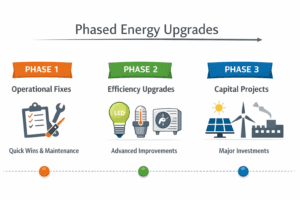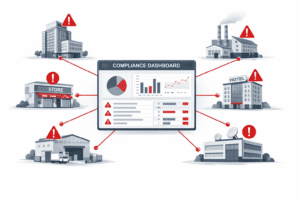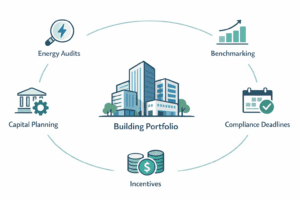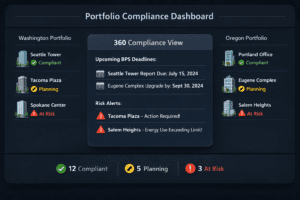San Francisco property compliance is more than just a legal requirement—it’s essential for protecting your investment. Miss a deadline, and you risk fines, legal issues, and operational disruptions. In San Francisco, commercial property owners face strict regulations, with non-compliance leading to hefty fines, legal issues, and even operational disruptions. With 2025 bringing key deadlines for energy benchmarking, fire safety, and accessibility updates, staying ahead isn’t just about avoiding penalties—it’s about protecting your investment. Yet, many owners find themselves scrambling at the last minute, unaware of the full scope of their responsibilities.

Understanding San Francisco’s evolving compliance landscape is essential for property owners who want to avoid unnecessary costs and legal headaches. From seismic retrofitting requirements to energy reporting mandates, failing to meet regulations can quickly drain resources and damage your property’s reputation. Fortunately, with the right strategies, staying compliant doesn’t have to be overwhelming. By proactively managing deadlines and bundling compliance services, owners can streamline the process and even reduce costs.
In this guide, we’ll break down the most critical compliance deadlines for 2025, outline the risks of missing them, and provide actionable steps to ensure your property stays compliant. Whether you’re managing multiple properties or just one, taking action now can save you from costly surprises later.
Key Compliance Deadlines for 2025
San Francisco property owners must be aware of several critical compliance deadlines in 2025. Missing these deadlines can lead to fines, legal action, and operational disruptions.
- Energy Benchmarking (April 1, 2025): Buildings over 10,000 square feet must report their energy use annually to comply with the Existing Buildings Energy Ordinance. Failure to file can result in escalating fines, starting at $100 per day for smaller properties and up to $1,500 per day for larger ones.
- Fire Safety Inspections (June 30, 2025): Annual fire safety certifications are required to ensure compliance with local fire codes. This includes maintaining clear egress paths, updating sprinkler systems, and inspecting fire alarms. Non-compliance can lead to violations, legal penalties, and even temporary closures.
- Seismic Retrofitting (December 31, 2025): Soft-story buildings must meet the final deadline for seismic upgrades under the Mandatory Soft Story Retrofit Program. Owners who fail to comply risk steep penalties and potential condemnation of unsafe structures.
- Accessibility Upgrades (Ongoing Compliance): Under the Americans with Disabilities Act (ADA) and the San Francisco Accessible Business Entrance Program, property owners must ensure their buildings are accessible to individuals with disabilities. Non-compliance can result in lawsuits and government enforcement actions.
Risks of Non-Compliance

Miss a deadline? It’s more than just a fine—you could face lawsuits, lost tenants, or even forced closures. Property owners may face:
- Legal action and fines: Regulatory agencies impose increasing fines for continued non-compliance, significantly impacting profitability.
- Loss of tenants and reputation damage: Tenants seek compliant buildings to avoid disruptions and potential safety risks.
- Operational shutdowns: Unresolved violations can lead to business closures, limiting property income and resale value.
Strategies to Stay Compliant
- Implement a Compliance Calendar: Track key deadlines and set reminders well in advance to avoid last-minute scrambling.
- Conduct Regular Inspections: Hire professionals to assess fire safety, energy efficiency, and seismic readiness to stay ahead of compliance requirements.
- Bundle Compliance Services: Many service providers offer packages that combine benchmarking, audits, and safety inspections, reducing costs and administrative burden.
- Work with Compliance Experts: Engaging consultants or legal advisors can ensure all requirements are met, reducing liability risks.
By taking proactive steps, San Francisco property owners can navigate 2025’s compliance requirements efficiently and protect their investments. The next section will outline additional resources and professional services to simplify the process further.
Conclusion
Staying compliant in San Francisco doesn’t have to be overwhelming or expensive. By bundling Benchmark and Audit services, property owners can streamline the process, reduce costs, and ensure they meet key 2025 deadlines without last-minute stress. Instead of juggling multiple vendors and deadlines, a bundled approach simplifies compliance, minimizes administrative work, and helps you stay ahead of potential fines or legal issues.
Don’t wait until it’s too late. Schedule a free consultation today and see how our bundled services can save you time, money, and legal trouble schedule a consultation now.
VertPro.com offers tools and services to help property owners and managers improve building energy efficiency and meet regulatory standards. Whether you’re looking for instant pricing on energy audits, need support with benchmark compliance, or want to explore available building upgrade options, VertPro® provides user-friendly technology solutions to simplify the process. Their platform helps ensure adherence to over 60 Energy Benchmarking and Efficiency Laws across the country.
For those looking to improve their property’s energy usage and operational value, VertPro.com provides a diverse array of tools and information. The site aims to facilitate a better understanding of energy efficiency practices and legislation, helping building owners and property managers make informed decisions about their energy strategies while complying with all energy ordinances and laws.















